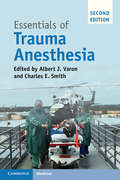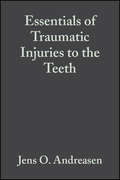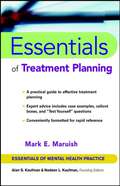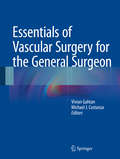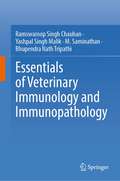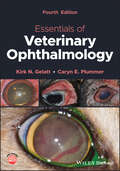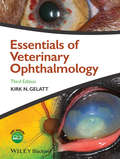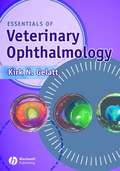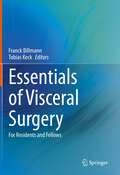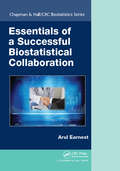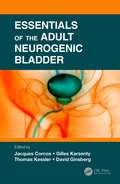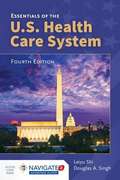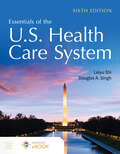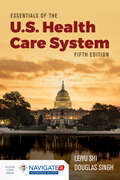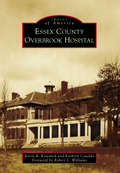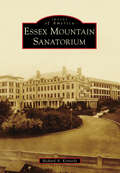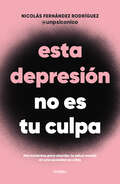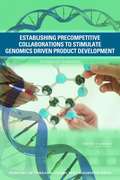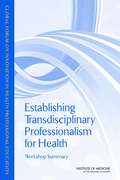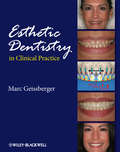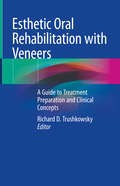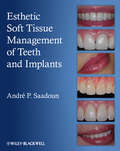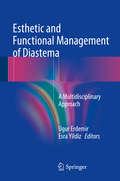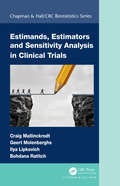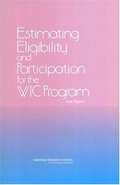- Table View
- List View
Essentials of Trauma Anesthesia
by Albert J. Varon Charles E. SmithCovering the most important topics in trauma anesthesia, this updated edition provides anesthesiology trainees and practitioners with a practical basis for managing trauma patients. Many recent advances in trauma care are identified, including paradigm shifts in the management of bleeding and coagulopathy, new neuromuscular blockade and anticoagulant reversal drugs, and updated clinical practice guidelines. This volume provides a concise, practical review of the essential elements in the care of the severely injured trauma patient, including emergency airway management, fluid and blood resuscitation, monitoring, coagulation therapy, regional and general anesthesia, and perioperative care. Edited by two of the most experienced trauma anesthesiologists in the USA, with chapters written by experts from leading US and Canadian trauma centers with the highest and most varied caseload of critically injured patients, Essentials of Trauma Anesthesia identifies new trends in surgery and anesthesiology practices that impact on the management of trauma patients. Includes the most important topics in trauma anesthesia, providing anesthesiologists with a solid foundation for managing trauma. Offers a concise review of the essential elements in the care of the severely injured trauma patient. Identifies new trends in surgery and anesthesiology practices that impact the management of trauma patients, including echocardiography and regional anesthesia.
Essentials of Traumatic Injuries to the Teeth: A Step-by-Step Treatment Guide
by Frances M. Andreasen Jens O. AndreasenThis is a readily accessible, fully illustrated guide to the initial treatment of acute dental injuries. The clinician is guided through the initial examination of the traumatized patient to the design of a rational, individualized treatment plan. This approach is aimed at minimizing the risk of long-term complications and, thereby, alleviating the uncertainty of the future of the the traumatized dentition both for the patient, dentist and for other concerned individuals. The material is drawn from clinical investigations, statistical analysis of 20,000 records of patients treated for acute dental injuries over 25 years, and results from 100 experimental studies.
Essentials of Treatment Planning
by Mark E. MaruishPsychologists, psychiatrists, clinical social workers, and other behavioral health care professionals practicing in this new millennium are all aware of the importance of having a specific, individualized plan to guide the treatment of their patients. Many of these same people might be surprised to know that formalized treatment planning is a relatively new component of mental health and substance abuse treatment.
Essentials of Vascular Surgery for the General Surgeon
by Vivian Gahtan Michael J. CostanzaThis volume provides a concise and up to date resource that directly addresses the needs of general surgeons who perform vascular surgery by focusing on the diagnosis and clinical management of common vascular conditions. The volume is divided into sections on arterial disease, venous disease, vascular trauma, and vascular access. Chapters on arterial disease outline the management and surgical techniques for the treatment of acute limb ischemia, compartment syndrome, and diabetic foot infections. Chronic arterial disease is addressed in chapters devoted to the management of claudication, critical limb ischemia, and lower extremity amputation. The section on vascular trauma emphasizes surgical intervention for blood vessel injuries that occur in the neck, abdomen, and extremity. Vascular access chapters deal with the technical aspects and potential complications of temporary venous access catheters and permanent arteriovenous access for hemodialysis. More complex vascular topics are also covered with chapters that are shorter in length and focused on the diagnosis and a broad understanding of treatment options. Essentials of Vascular Surgery for the General Surgeon is the first of its kind to accurately mirror the SCORE curriculum for vascular disease as a patient care topic in general surgery training, acting as a "one stop" information source that general surgery trainees can turn to as a clinical reference and as a study guide for general surgery in service exams and board.
Essentials of Veterinary Immunology and Immunopathology
by Yashpal Singh Malik Ramswaroop Singh Chauhan M. Saminathan Bhupendra Nath TripathiThis textbook for graduate veterinary students provides basic concepts of veterinary immunopathology with particular reference to immunopathogenesis. The initial chapters provide up-to-date knowledge on important aspects of immunology, immunodeficiency disorders, hypersensitivity reactions, and autoimmune disorders of various animal species. The book examines different natural and synthetic immunomodulatory products that can modulate the immune system of animals. It discusses the immunopathogenesis and immunopathology of multiple diseases and immunopathological disorders in diverse animal species, including cattle, buffalo, sheep, goat, swine, equine, and laboratory animals. The book also covers the immunopathology of various body systems, including lungs, reproductive system, enteric system, mammary gland, joints, kidneys, and skin. It provides clinical manifestations that are useful in diagnosing immunopathological conditions. The book presents a highly informative text with highquality gross and microscopic photographs, diagrammatic presentations of immunopathological disorders and techniques, making it useful in both classrooms and professional training courses for students, researchers, and professionals alike.
Essentials of Veterinary Ophthalmology
by Kirk N. Gelatt Caryn E. PlummerA user-friendly reference to basic, foundational information on veterinary ophthalmology This book provides readers with a user-friendly manual to the basics of veterinary ophthalmology. It puts a focus on the most relevant information for clinical practice. Emphasizing canine ophthalmology, the book also covers the foundations of feline, equine, farm animal, and exotic animal ophthalmology. To aid in reader comprehension and information assimilation, a companion website presents review questions and the figures from the book in PowerPoint. Sample topics covered within the work include: Ophthalmic foundations: ophthalmic development and structure, physiology of the eye and vision, and ocular pharmacology and therapeutics Canine ophthalmology: canine orbit (disease and surgery), canine eyelids (disease and surgery), canine lacrimal apparatus (tear secretion and drainage), canine cornea (diseases and surgery) and canine glaucoma Other species: feline ophthalmology, equine ophthalmology, and food and fiber animal ophthalmology Ophthalmic and systemic diseases: comparative neuro-ophthalmology and systemic disease and the eye Essentials of Veterinary Ophthalmology is a useful guide for veterinary students and practitioners looking to build out their core foundations of knowledge within their specific programs of study and disciplines.
Essentials of Veterinary Ophthalmology
by Kirk N. GelattEssentials of Veterinary Ophthalmology, Third Edition offers an updated introduction to the diagnosis and clinical management of ocular conditions in veterinary patients, providing trusted information in a user-friendly format. The content of the book is distilled from the fifth edition of the gold-standard reference Veterinary Ophthalmology, emphasizing the information most relevant to veterinary students and general practitioners. Fully updated throughout, the Third Edition focuses more strongly on small animals and horses, with streamlined coverage of other species, and new chapters have been added on morphology, physiology, and pharmacology. Carefully designed to be equally useful for learning and in practice, the book offers a streamlined, practical approach, with bolded terms to enhance comprehension. High-quality color photographs provide visual depictions of the conditions discussed. Essentials of Veterinary Ophthalmology, Third Edition is an indispensable resource for veterinary students or clinicians wishing to hone their ophthalmology knowledge and skills.
Essentials of Veterinary Ophthalmology (Second Edition)
by Kirk N. GelattNow in its second edition, Essentials of Veterinary Ophthalmology provides its readers with a practical introduction to the diagnosis and clinical management of the most frequently encountered eye diseases of domestic animals. Essentials of Veterinary Ophthalmology is distilled from the authoritative, two-volume, fourth edition of Veterinary Ophthalmology (Gelatt), drawing primarily on the clinically relevant sections to provide expert coverage in a more concise and quick-reference format - ideal for busy small animal or equine practitioners seeking rapid advice for a patient. The second edition includes more images, algorithms to speed the clinical problem-solving process, key points highlighted in bold, expanded appendices for convenient reference to therapeutic agents, recommended dosages, and possible side effects, and a brief glossary.Practical and accessible, the second edition of Essentials of Veterinary Ophthalmology is filled with reader-friendly features to provide veterinary students and practitioners with an indispensable resource for the fundamentals of clinical veterinary ophthalmology.* Focuses on the most common eye diseases of small animals and horses* Provides expert coverage in a concise, quick-reference format* New edition includes more images, algorithms, key points in bold, expanded appendices and glossary* Based on the two-volume definitive reference Veterinary Ophthalmology, 4th Edition (Gelatt)
Essentials of Visceral Surgery: For Residents and Fellows
by Franck Billmann Tobias KeckThe 2nd edition of the successful book also summarises the factual knowledge of visceral surgery in a condensed, keyword-like form. It is suitable for preparation for the specialist examination as well as for quick reference in everyday clinical practice.All articles have been written by renowned experts. The focus is on detailed recommendations on the diagnostic procedure, the indication and the implementation of therapy; for the most important interventions, the steps of the surgical procedure are also presented. Brief overviews facilitate the targeted memorisation of the most important facts.
Essentials of a Successful Biostatistical Collaboration (Chapman & Hall/CRC Biostatistics Series)
by Arul EarnestThe aim of this book is to equip biostatisticians and other quantitative scientists with the necessary skills, knowledge, and habits to collaborate effectively with clinicians in the healthcare field. The book provides valuable insight on where to look for information and material on sample size and statistical techniques commonly used in clinical research, and on how best to communicate with clinicians. It also covers the best practices to adopt in terms of project, time, and data management; relationship with collaborators; etc.
Essentials of the Adult Neurogenic Bladder
by Jacques Corcos, Gilles Karsenty, Thomas Kessler and David GinsbergThis book summarises the entire field of adult neuro-urology in a concise, well-illustrated, and practical style. Contents include epidemiology, lower urinary tract anatomy and physiology. This is followed by coverage of the pathophysiology of various types of voiding dysfunctions and a clinical section focusing on practical evaluation and treatment. A range of treatments from behavioral, pharmacological, intra vesical, tissue engineering and surgical are explained and reviewed. Other topics such as complications, sexual function, fertility, maternity aspects, and prognostic factors round off the book. *Each topic is covered in detail and well illustrated. *The reader will gain a full understanding of every aspect of adult neuro-urology. *Facilitates improved clinical knowledge and practice. Provides an essential and complete reference tool for students and established urologists, neurologists, physiotherapists and nurses, and technicians involved in the care of patients with neurogenic bladder dysfunction.
Essentials of the U. S. Health Care System
by Leiyu Shi Douglas A. SinghEssentials of the U.S. Health Care System, Fourth Edition is a clear and concise distillation of the major topics covered in the best-selling Delivering Health Care in America by the same authors. Designed for undergraduate and graduate students in programs across the health disciplines, Essentials of the U.S. Health Care System is a reader-friendly, well organized resource that covers the major characteristics, foundations, and future of the U.S. health care system. The text clarifies the complexities of health care organization and finance and presents a solid overview of how the various components fit together. <P><P>Readers will gain the necessary tools to understand the unique dynamics of the U.S. health care system, including health care delivery, public policy, and the placement of the U.S. health care system within the larger context of global health care.
Essentials of the U.S. Health Care System
by Leiyu Shi Douglas A. SinghEssentials of the U.S. Health Care System, Sixth Edition is a clear and concise distillation of the major topics covered in the best-selling Delivering Health Care in America by the same authors. Written with the undergraduate in mind, Essentials of the U.S. Health Care System is a reader-friendly, well organized resource that covers the major characteristics, foundations, and future of the U.S. health care system. The text clarifies the complexities of health care organization and finance and presents a solid overview of how the various components fit together. Key Features: - Updated new data for tables, charts, figures, and text based on the latest published data - Coverage of COVID-19 - The latest on the Affordable Care Act including its effects of insurance, access, and cost. - Navigate eBook access (included with each print text) provides online or offline access to the digital text from a computer, tablet, or mobile device.
Essentials of the U.S. Health Care System
by Leiyu Shi Douglas A. SinghEssentials of the U.S. Health Care System, Fifth Edition is a clear and concise distillation of the major topics covered in the best-selling Delivering Health Care in America by the same authors. Designed for undergraduate and graduate students in programs across the health disciplines, Essentials of the U.S. Health Care System is a reader-friendly, well organized resource that covers the major characteristics, foundations, and future of the U.S. health care system. The text clarifies the complexities of health care organization and finance and presents a solid overview of how the various components fit together.
Essex County Overbrook Hospital (Images of America)
by Robert L. Williams Kevin R. Kowalick Kathryn CataldoWhat was founded as the Essex County Lunacy Asylum evolved from a single building on South Orange Avenue to a city within itself in Cedar Grove. It was named the Essex County Overbrook Hospital. Construction began on the hospital's iconic brick buildings in 1896, and they were prominent features on Fairview Avenue for the next 100 years. The facility produced its own food, housed its own police and fire departments, and sustained its own power sources. The Essex County Overbrook Hospital was recognized throughout the world as a leader in psychiatric care. In later years, overcrowding began to plague the institution. However, after the advent of modern psychiatric drugs, many patients were able to be discharged back into the community. In 2007, the buildings were closed, and the hospital was relocated to a newer establishment nearby. The grounds have since been plagued with vandalism and neglect, with a final deal for demolition having been solidified in 2015.
Essex Mountain Sanatorium (Images of America)
by Richard A. KennedyFounded in 1907 amidst protests and a burgeoning suffrage movement, Essex Mountain Sanatorium was the result of two Montclair, New Jersey, women who successfully lobbied local government to establish a tuberculosis sanatorium in a then vacant cottage for wayward girls. From these humble beginnings, the hospital grew to become one of the finest treatment centers in the nation, expanding into a complex of 20 buildings that encompassed nearly 300 acres. Ironically, medical advances pioneered at places such as the sanatorium and the advent of antitubercular drugs in the years following World War II led to decreasing patient enrollment, which made such large facilities unnecessary. When it was eventually abandoned in the early 1980s, the hospital began its second act as a haven for urban explorers, vandals, and arsonists, becoming shrouded in mystery and the source of local legends and myths. After suffering years of neglect and abuse, the main complex would finally fall to wreckers in 1993, ending an important era in county, state, and national history.
Esta depresión no es tu culpa
by Nicolás FernándezEn una sociedad que ha descuidado la salud mental para privilegiar la productividad, el psicólogo y creador de contenidos en Instagram @unpsiconico propone una mirada comunitaria para sanar y alejarse del positivismo tóxico. El psicólogo Nicolás Fernández echa por tierra afirmaciones como "primero debes quererte a ti mismo para que te quieran", "vamos que se puede", "es cuestión de ánimo" y otras frases hechas patentadas por el positivismo tóxico y, en cambio, promueve las buenas prácticas colectivas y políticas para combatir la pandemia de salud mental que es la depresión. Con guiños a su propia experiencia como paciente y terapeuta, Esta depresión no es tu culpa entrega herramientas y una mirada contenedora y colaborativa frente a un tema de preocupación global.
Establishing Precompetitive Collaborations to Stimulate Genomics-Driven Drug Development: Workshop Summary
by The National Academy of SciencesDespite the many basic research discoveries in genetics, relatively few gene-based treatments, drugs, or preventative measures have been developed. One way to bridge this gap may be for industry, academia, and government to develop partnerships that share resources while distributing risk. However, intellectual property protections and other barriers can inhibit collaborative efforts. The Institute of Medicine held a workshop on July 22, 2010, to explore these issues and develop solutions.
Establishing Transdisciplinary Professionalism for Improving Health Outcomes
by Patricia A. Cuff"Establishing Transdisciplinary Professionalism for Improving Health Outcomes" is a summary of a workshop convened by the Institute of Medicine Global Forum on Innovation in Health Professional Education to explore the possibility of whether different professions can come together and whether a dialogue with society on professionalism is possible. Most of the 59 members making up the Global Forum were present at the workshop and engaged with outside participants in active dialogue around issues related to professionalism and how the different professions might work effectively together and with society in creating a social contract. The structure of the workshop involved large plenary discussions, facilitated table conversations, and small-group breakout sessions. In this way, the members - representing multiple sectors, countries, health professions, and educational associations - had numerous opportunities to share their own perspectives on transdisciplinary professionalism as well as hear the opinions of subject matter experts and the general public. Efforts to improve patient care and population health are traditional tenets of all the health professions, as is a focus on professionalism. But in a time of rapidly changing environments and evolving technologies, health professionals and those who train them are being challenged to work beyond their traditional comfort zones, often in teams. A new professionalism might be a mechanism for achieving improved health outcomes by applying a transdisciplinary professionalism throughout health care and wellness that emphasizes crossdisciplinary responsibilities and accountability. "Establishing Transdisciplinary Professionalism for Improving Health Outcomes" discusses how shared understanding can be integrated into education and practice, ethical implications of and barriers to transdisciplinary professionalism, and the impact of an evolving professional context on patients, students, and others working within the health care system.
Esthetic Dentistry in Clinical Practice
by Marc GeissbergerAs esthetic dentistry continues to grow in popularity, dentists are offered an opportunity to expand their practices and attract new patients. Esthetic Dentistry in Clinical Practice provides dentists with the skills to take advantage of that opportunity. Clearly outlining esthetic procedures, the book enables dentists to treat patients in an efficient and clinically sound manner, bringing esthetic dentistry to everyday practice.
Esthetic Oral Rehabilitation with Veneers: A Guide to Treatment Preparation and Clinical Concepts
by Richard D. TrushkowskyThis book acquaints the clinician with the full range of parameters that need to be considered before undertaking an esthetic rehabilitation with veneers and describes current clinical concepts and techniques. The initial chapters provide the foundation for a comprehensive treatment plan. It is explained how digital smile design in conjunction with a wax-up and functional esthetic prototype allow a patient to visualize the possibilities. Occlusion prior to the initiation of treatment and following treatment is key to the longevity of restorations, and this aspect is given careful consideration. Detailed advice is also offered on proper selection of materials and their placement. The guidance provided will ensure that the reader is fully equipped to gather and assess all relevant information prior to commencement of the final treatment. The treatment itself can range from minimally invasive to more complex depending on the requirements of each individual case. Among the clinical concepts discussed in the book are the use of etched porcelain restorations, minimally invasive CAD/CAM veneers, and the ink glue technique.
Esthetic Soft Tissue Management of Teeth and Implants
by Andre P. SaadounThis book offers a step-by-step guide to success in periodontics and implant dentistry, helping clinicians to create a natural and esthetically pleasing smile for their patients. Starting with a general discussion of facial esthetics and analyzing the dento-gingival constituents of the smile, the book goes on to consider the impact of these on people's quality of life. Subsequent chapters focus on specific esthetic treatments such as crown lengthening procedures, gingival recession coverage with connective tissue grafts or periodontal regenerative material and soft tissue management for natural teeth and implants.
Esthetic and Functional Management of Diastema
by Ugur Erdemir Esra YildizThis book offers detailed guidance on integrated orthodontic, periodontal, and restorative solutions for the treatment of diastema, highlighting the advantages of such a multidisciplinary approach and presenting suitable clinical protocols for esthetic reconstruction and functional improvement. The coverage includes discussion of diagnosis and explanation of important elements of dentofacial, dentolabial, and dental analysis and relevant soft tissue aspects. Clear advice is provided on treatment planning, and the various treatment options are fully described, with consideration of new materials and techniques and attention to timing and sequencing. The book benefits from the inclusion of numerous clinical case photos. It will be an excellent aid to the management of patients in whom correction of diastemas is only possible through multidisciplinary interventions.
Estimands, Estimators and Sensitivity Analysis in Clinical Trials (Chapman & Hall/CRC Biostatistics Series)
by Bohdana Ratitch Craig Mallinckrodt Ilya Lipkovich Geert MolenberghsThe concepts of estimands, analyses (estimators), and sensitivity are interrelated. Therefore, great need exists for an integrated approach to these topics. This book acts as a practical guide to developing and implementing statistical analysis plans by explaining fundamental concepts using accessible language, providing technical details, real-world examples, and SAS and R code to implement analyses. The updated ICH guideline raises new analytic and cross-functional challenges for statisticians. Gaps between different communities have come to surface, such as between causal inference and clinical trialists, as well as among clinicians, statisticians, and regulators when it comes to communicating decision-making objectives, assumptions, and interpretations of evidence. This book lays out a path toward bridging some of these gaps. It offers A common language and unifying framework along with the technical details and practical guidance to help statisticians meet the challenges A thorough treatment of intercurrent events (ICEs), i.e., postrandomization events that confound interpretation of outcomes and five strategies for ICEs in ICH E9 (R1) Details on how estimands, integrated into a principled study development process, lay a foundation for coherent specification of trial design, conduct, and analysis needed to overcome the issues caused by ICEs: A perspective on the role of the intention-to-treat principle Examples and case studies from various areas Example code in SAS and R A connection with causal inference Implications and methods for analysis of longitudinal trials with missing data Together, the authors have offered the readers their ample expertise in clinical trial design and analysis, from an industrial and academic perspective.
Estimating Eligibility and Participation for the WIC Program: Final Report
by Panel to Evaluate the USDA's Methodology for Estimating Eligibility Participation for the WIC ProgramThis report reviews the methods used to estimate the national number of people eligible to participate in the Special Supplemental Nutrition Program for Women, Infants, and Children (WIC) under full funding of the program. It reviews alternative data sets and methods for estimating income eligibility, adjunctive eligibility (which occurs when people are eligible for WIC because they are enrolled in other federal public assistance programs) and nutritional risk, as well as for estimating participation if the program is fully funded.
